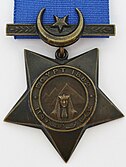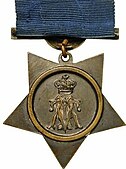
The Anglo-Egyptian Sudan was a condominium of the United Kingdom and Egypt in the eastern Sudan region of northern Africa between 1899 and 1956, but in practice the structure of the condominium ensured full British control over the Sudan with Egypt having local influence instead. It attained independence as the Republic of the Sudan, which since 2011 has been split into Sudan and South Sudan.

Mohamed Tewfik Pasha, also known as Tawfiq of Egypt, was khedive of Egypt and the Sudan between 1879 and 1892 and the sixth ruler from the Muhammad Ali Dynasty.

The Military General Service Medal (MGSM) was a campaign medal approved in 1847 and issued to officers and men of the British Army in 1848.

The Baltic Medal was a campaign medal approved on 6 June 1856, for issue to officers and men of the Royal Navy, Royal Marines, and Royal Sappers and Miners who served between March 1854 and August 1855 in the Baltic Sea operations against Russia in the Baltic theatre of the Crimean War, or Åland War. The medal primarily covered naval actions but was also awarded to 106 men of the Royal Sappers and Miners who were landed to place demolition charges against Russian fortifications at Bomarsund and Sveaborg.

Osman Digna was a follower of Muhammad Ahmad, the self-proclaimed Mahdi, in Sudan, who became his best known military commander during the Mahdist War. He is descendant from the Abbasid family. As the Mahdi's ablest general, he played an important role in the fate of General Charles George Gordon and the loss of the Sudan to Turkish-Egyptian rule.
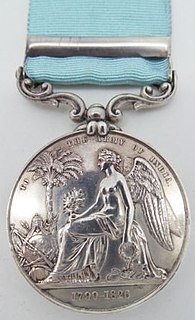
The Army of India Medal (AIM) was a campaign medal approved in 1851 for issue to officers and men of the British Army and the Army of the Honourable East India Company. A retrospective award following the precedent set by the Naval General Service Medal and the Military General Service Medal, it served to reward service in various actions from 1803 to 1826.
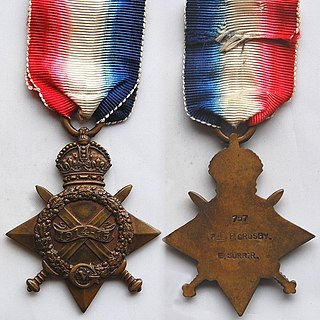
The 1914–15 Star is a campaign medal of the British Empire which was awarded to officers and men of British and Imperial forces who served in any theatre of the First World War against the Central European Powers during 1914 and 1915. The medal was never awarded singly and recipients also received the British War Medal and Victory Medal.

The First and Second Battles of El Teb took place during the British Sudan Campaign where a force of Sudanese under Osman Digna won a victory over a 3500 strong Egyptian force under the command of General Valentine Baker which was marching to relieve Tokar on the 4th. A second British force under Sir Gerald Graham arrived on the 29th, engaging and defeating Osman Digna with few casualties.
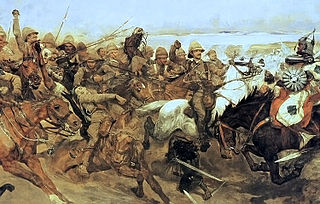
The Mahdist War was a war between the Mahdist Sudanese of the religious leader Muhammad Ahmad bin Abd Allah, who had proclaimed himself the "Mahdi" of Islam, and the forces of the Khedivate of Egypt, initially, and later the forces of Britain. Eighteen years of war resulted in the nominally joint-rule state of the Anglo-Egyptian Sudan (1899–1956), a de jure condominium of the British Empire and the Kingdom of Egypt in which Britain had de facto control over the Sudan. The Sudanese launched several unsuccessful invasions of their neighbours, expanding the scale of the conflict to include not only Britain and Egypt but the Italian Empire, the Congo Free State and the Ethiopian Empire.

The Battle of Toski (Tushkah) was part of the Mahdist War. It took place on August 3, 1889 in southern Egypt between the Anglo-Egyptian forces and the Mahdist forces of the Sudan.

The Battle of Ferkeh occurred during the Mahdist War in which an army of the Mahdist Sudanese was surprised and routed by British-led Egyptian forces, led by Sir Herbert Kitchener, on 7 June 1896. It was the first significant action of the reconquest of Sudan, which culminated in the September 1898 Battle of Omdurman.

The India Medal was a campaign medal approved in 1896 for issue to officers and men of the British and Indian armies.
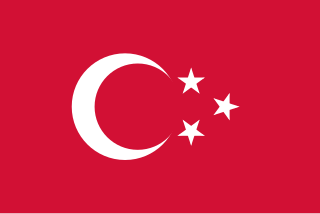
The Khedivate of Egypt was an autonomous tributary state of the Ottoman Empire, established and ruled by the Muhammad Ali Dynasty following the defeat and expulsion of Napoleon Bonaparte's forces which brought an end to the short-lived French occupation of Lower Egypt. The Khedivate of Egypt had also expanded to control present-day Sudan, South Sudan, Eritrea, Israel, Lebanon, Jordan, Syria, Greece, Cyprus, southern and central Turkey, and northwestern Saudi Arabia.

The Battle of Suakin, part of the Mahdist War, occurred on 20 December 1888 when General Francis Grenfell defeated a Mahdist, or Dervish, force near Suakin, a chief port of Sudan.

The Egypt Medal (1882–1889) was awarded for the military actions involving the British Army and Royal Navy during the 1882 Anglo-Egyptian War and in the Sudan between 1884 and 1889.

The Queen's Sudan Medal was authorised in March 1899 and awarded to British and Egyptian forces which took part in the Sudan campaign between June 1896 and September 1898.

The Ashanti Star was created in 1896 for the members of the expedition against the Ashanti King Prempeh, in the Fourth Anglo-Ashanti War that lasted from December 1895 to February 1896.

The Kabul to Kandahar Star, also known as the Roberts Star or Kandahar Bronze Star was awarded to those British and Indian troops who participated in the 320 mile march from Kabul to Kandahar in Afghanistan between 9–31 August 1880, under the command of General Frederick Roberts. In addition, it was awarded to the troops stationed en route at Kelat-i-Ghilzie, who accompanied General Roberts on the final ninety miles to Kandahar.

The Khedive's Sudan Medal was a campaign medal awarded by the Khedivate of Egypt to both Egyptian and British forces for service during the reconquest of the Sudan, the final part of the Mahdist War. Established 12 February 1897 by Khedive Abbas Hilmi Pasha, this medal was initially to commemorate the reconquest of the Dongola province in 1896. It was subsequently authorised for later campaigns and actions until 1908. The medal was awarded with fifteen different clasps.

The Khedive's Sudan Medal was a campaign medal awarded by the Khedivate of Egypt for service in the Anglo-Egyptian Sudan. Established in 1911 by the Khedive, this medal replaced the earlier Khedive's Sudan Medal (1897) and was superseded by the Sudan Defence Force General Service Medal (1933).
